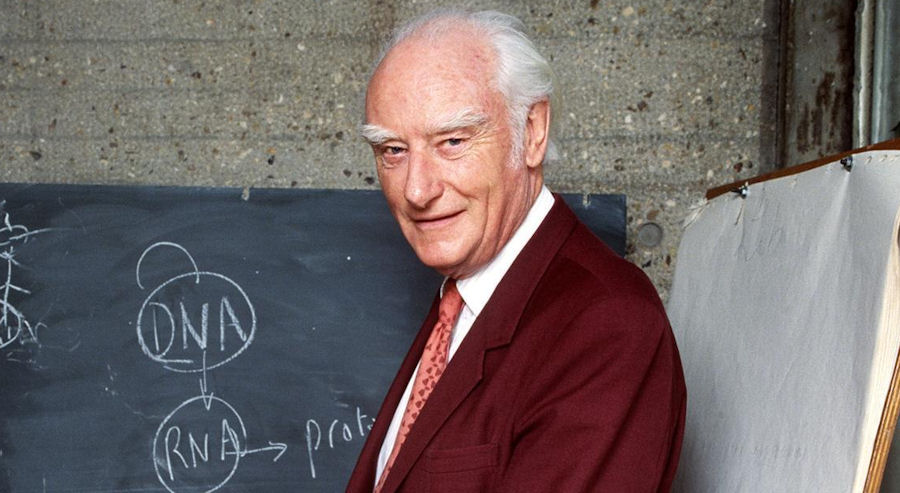
Podcast: Play in new window | Download
Subscribe: Spotify | Amazon Music | Youtube Music | RSS
Francis Crick Biography
Francis Harry Campton Crick is one of the most influential and brilliant scientific minds of the 20th century. Dabbling in various fields but specifically in physics and microbiology, Francis Crick was a specialist in a highly specialised field.
Born 8 June 1916 Francis Crick’s family was certainly no stranger to a high scientific pedigree. His grandfather was a talented naturalist and enjoyed his study of the living world and even began a correspondence with Charles Darwin. Francis Crick himself had a deep and abiding love for science and rigorous scientific thought from a very young age. He was a self-taught scholar extensively reading any and all scientific books that he could acquire. At the young age of 12, he even requested that his parents excuse him from going to church as he believed that the subject of religion was outside of the purview of scientific thought which is what he wanted to pursue.
As a brilliant and gifted young scientist, Crick attained a Bachelor of Science diploma from University College London. Like most gifted people, though, he did seem to have an Achilles heel which was language arts. He attempted to gain entrance to study at Cambridge, but his application was rejected almost certainly due to his failing Latin classes. In this day and age, it seems silly that an inability to speak an almost dead language would keep one of the foremost scientific minds out of higher learning, but this was the early 20th century and such institutions did and in many places still do hold this style of education in high regard.
Crick eventually found a college that would accept him and he began his first PhD project attempting to measure the viscosity of water while at extreme temperatures. His idea was that the viscosity of water changed as the temperature of the water rose and went to work attempting to study this change while during his time at University College London.
To many, this may sound incredibly boring and Francis Crick would agree with you as he once mentioned that it was the “dullest problem imaginable”. Fortunately, Crick was saved by the outbreak of World War II and, more specifically, he was saved by a German bomb which fell through the roof and blew up the laboratory that he was working in. The destruction of his project allowed Crick to turn his attention to other fields of science.
Like most true-hearted Brits, he had a strong desire to serve his country during World War II and worked at the Admiralty Research Laboratory during the war years. One of the specific projects he worked on was one that saved the lives of countless British and American sailors by helping design mines that could be used successfully against German minesweepers. This was a big innovation as it limited German ship movements and the capabilities of their minesweepers.
Having been saved from a life studying chemistry, Crick in 1947 went on to begin studying biology which is where his brilliant career would truly shine. The year 1953 is probably the crowning moment of his career or at least the one that the general populace is most familiar with. It was in that year that Francis Crick while working in tandem with James Watson, discovered the structure of DNA molecules.
Discovering this structure was a major scientific and biological leap into the future. From this initial assessment, many things about the process of the natural world could be explained. It opened up brand new ideas of how to study genetics, heredity, and even methodologies of fighting new diseases with a better understanding of how the natural world itself works.
Crick’s initial discovery has led to our technological advancement where things such as DNA and gene editing as well as gene therapy are becoming more acceptable; none of which would have happened without the initial discovery of the structure and shape of the DNA molecule, the building block of life.
The find was so stunning to the scientific community that it deserved a serious level of recognition and together with fellow contributors James Watson and Maurice Wilkins, Francis Crick was awarded the Nobel Prize in Physiology or Medicine in 1962.
Not a man to rest on his laurels, Crick had many more years studying biology and the structure of the brain, attempting to determine the basis for human consciousness. His work was highly innovative and continues to spur many debates and practical ideas up to the present day about what consciousness truly is.
Francis Crick, a brilliant scientist up to the very end, was continuing to research and edit manuscripts even on his deathbed. He passed away on 28 July 2004 at the age of 88. With a brilliant career spanning many decades, he was the recipient of a slew of awards such as the Albert Lasker Award for basic medical research, the Nobel Prize, the Royal Medal, the Alberta Medal, and various other awards and honours heaped upon him during his career as one of the foremost molecular biological scientists of the twentieth and twenty-first centuries. Francis Crick did not go quietly into the night but rather up to his dying hours spent them trying to benefit humanity through his belief in science.
Podcast: Play in new window | Download
Subscribe: Spotify | Amazon Music | Youtube Music | RSS




